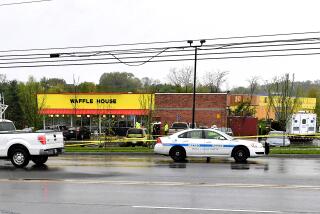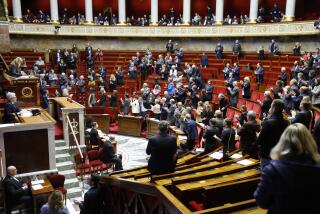What the Iraq war won’t do for liberalism
- Share via
NED LAMONT’S Democratic primary victory Tuesday in Connecticut has given liberals hope that they can leverage the debacle in Iraq to catapult themselves back into power. And that may very well come to pass. Yet, ironically, what’s good news for liberal candidates may not be such good news for liberalism.
Why? Because the same quagmire that created this electoral opportunity has also forged a political climate that can’t support liberalism’s true goal: using government for the common good.
Over the last several years, a growing number of intellectuals have been trying to push liberalism away from the oppositional politics of the New Left back toward the governing philosophy of the New Deal.
Last year, Princeton University sociologist Paul Starr called on liberals to remember that their ideology once stood for bold idealism and the belief that government could make a positive difference. He reminded them that in the post World War II-era, liberalism was “the innovative and outward-looking force in American politics,” while conservatism was “the stodgy and parochial source of resistance.” He feared that the roles had been reversed.
Last May, Michael Tomasky seconded the call for renewal in the journal he edits, American Prospect. What Democrats need, he wrote, is a “big idea that unites their proposals and converts them from a hodgepodge of narrow and specific fixes into a vision for society.”
They were both conjuring the politics founded by President Franklin D. Roosevelt. Although FDR’s conservative foes stumped for small government and took a dim view of human potential, he proclaimed a big idea: Government had the “innate capacity to protect its people against disasters once considered inevitable, to solve problems once considered unsolvable.” Driven by this philosophy, the Roosevelt administration gave us Social Security, the first minimum wage law and the Federal Deposit Insurance Corp.
But it didn’t happen in a vacuum. FDR’s big idea, born in the Depression, was consolidated, nurtured and embraced in World War II -- the Good War -- which provided, as it happens, ideal conditions for American liberalism. Overwhelming public support for the war effort created national unity, collective responsibility and a willingness to sacrifice. Americans supported expanded government driven by taxes, which increased dramatically during the war. The Allied victory then ushered in a period of high expectations of what government could accomplish.
The ripple effect was so strong that no matter which political party occupied the White House for the next two decades, a liberal consensus held sway over the American body politic. It built federal highways, created student loans and enacted civil rights legislation.
Today, as liberals seek to rebuild that kind of agenda, they have nothing like a Good War to help them. In fact, what they are facing is a situation much more like the Vietnam War -- in which the public was polarized and disillusioned -- and its belief in what government could accomplish was demolished.
The Vietnam War escalated in 1965 and ended in 1975. The debate between the war’s supporters and those who called for withdrawal created deep and lasting political divisions that undermined the national unity required to tackle liberalism’s big ideas. As historian James T. Patterson wrote: “Nothing did more than Vietnam to subvert the grand expectations that many Americans had developed by 1965 about the capacity of government to deal with public problems.” This distrust and disunity was the fertile ground from which anti-government conservatives made their late-century comeback.
For a brief moment after Sept. 11, public faith in government rose again. But it quickly evaporated, and by early 2004, when the majority of Americans began to believe that the costs of the war in Iraq were not worth the potential gains, that sense of trust eroded further. Today, the partisan divide over Iraq is three times more severe than it was during Vietnam, and one can’t imagine politicians building a healthy national consensus on anything.
The problem for liberals doesn’t stop there. Mired in opposition politics, they aren’t heeding the call to reformulate their agenda. They aren’t generating “big ideas” -- comprehensive healthcare reform, for example, or finding new ways to address growing economic insecurity.
“If the country were united behind a successful war effort, then inspiring people to unite toward large, common goals would be easier,” Tomasky said. “This war makes it harder to move the political discourse in a new direction.”
More to Read
Get the L.A. Times Politics newsletter
Deeply reported insights into legislation, politics and policy from Sacramento, Washington and beyond. In your inbox twice per week.
You may occasionally receive promotional content from the Los Angeles Times.










